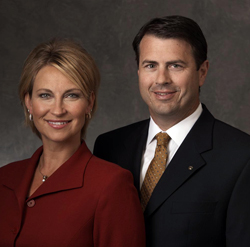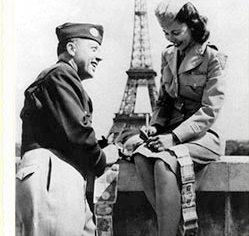 |
Omaha-natives Paul and Lori Hogan are the co-founders of Home Instead Senior Care, the world’s largest provider of non-medical home care for seniors. Pending regents’ approval, the new UNMC geriatrics center will be named for the Hogans’ company. |
The Home Instead Center for Successful Aging will offer specialized services aimed at helping seniors age better and live healthier lives. This unique facility is the only free-standing center tied to an academic medical center focused on aging in Nebraska and the region. The closest similar center is the Donald W. Reynolds Institute on Aging in Little Rock at the University of Arkansas for Medical Sciences.
The $10.2 million facility, funded entirely by private donations, will be located just south of the Weigel Williamson Center for Visual Rehabilitation at 38th Avenue and Leavenworth Street and create a centralized location for geriatric medicine and psychiatry on the UNMC campus. Construction on the three-level, 31,000 square-foot center is expected to be completed in the spring of 2010.
UNMC faculty, staff and students are invited online to view the 10:30 a.m. ceremony for the Home Instead Center for Successful Aging. The groundbreaking will be webcast live at www.unmc.edu.
Services offered at The Home Instead Center for Successful Aging will include a geriatric medicine clinic, geriatric psychiatry clinic, as well as access to clinical trials involving geriatric-specific disorders.
The center also will include a Community Education and Outreach Center that will house a fully equipped fitness and exercise area, and a wellness clinic for health screenings and nutrition services.
The center is named for Home Instead Senior Care, the world’s largest private provider of non-medical home care to seniors which was co-founded by the center’s principal donors, Lori and Paul Hogan. They made their gift to the University of Nebraska Foundation.
“We can’t thank the Hogans enough for their generous gift,” said UNMC Chancellor Harold M. Maurer, M.D. “This is a perfect example of how a public university can work together with a private company for the betterment of society. This is a mutually beneficial situation for both institutions and will allow us to take geriatric care in Nebraska to a whole new level. I couldn’t be more excited to watch this partnership flourish.”
 |
An artist’s rendering of the Home Instead Center for Successful Aging. |
“By combining our strengths, we will be able to greatly enhance the quality of the work that we both do on behalf of older people,” she said. “The partnership will provide a myriad of opportunities to learn from each other as we advance our clinical, research and educational initiatives.”
Today, people age 85 and older are the fastest growing segment of the population, and more than 36 million Americans are over the age of 65. By 2030, that number will nearly double and reach 71 million with one in every five Americans over the age of 65. Nebraska, along with other Midwestern states, has seen a rapid aging of its population due to greater natural longevity and an out-migration of younger people, said Dr. Potter, who served as president of the American Geriatrics Society in 2006-07 and chair of the AGS board of directors in 2007-08.
“This unique partnership is one more step in the Home Instead mission of helping seniors embrace aging,” said Paul Hogan, who serves as CEO for Home Instead Senior Care. “Together with UNMC, we want to change the face of aging. The old face of aging is fear and the new face is hope.”
“We share a common goal with UNMC, Dr. Potter and her team – to help people age more successfully. That’s why this distinct relationship between Home Instead and UNMC holds such tremendous promise. We are confident that by working together we can do much more than just address problems. We will find solutions to truly help seniors age more successfully. It’s an exciting day for us personally. But, more important, it marks the beginning of a unique partnership with the potential to touch the lives of thousands — even millions — of seniors around the world.”
The Home Instead Center for Successful Aging will create physical space for both the sections of geriatric medicine and geriatric psychiatry, which currently include six geriatric physicians, five geriatric psychiatrists and one geriatric psychologist.
The center will increase clinical and translational research, Dr. Potter said, by establishing an environment that will make it much more conducive for clinical trials for Alzheimer’s disease and other geriatric-specific disorders. Gerontology and geriatric medicine have been part of the medical school curriculum since 1981, and training in geriatrics has been mandatory for internal medicine and family medicine residents for more than 20 years.
Chronic and age-related diseases, such as diabetes, Alzheimer’s and heart disease place a tremendous strain on the U.S. health care system, Dr. Maurer said, noting that 40 percent of families have some type of caregiver for themselves or family members. At the same time, shortages of trained geriatric health care providers are predicted to reach crisis levels within the next few years.
“With the huge number of Baby Boomers now in retirement or nearing retirement, we consider providing quality care to seniors to be perhaps the most significant health care challenge faced by our country today,” he said. “The need for a specialized center for geriatric medicine has never been greater.”
The Hogans, who are both Omaha natives, have been longtime supporters of the University of Nebraska. Paul Hogan is a 1985 graduate of the University of Nebraska at Lincoln. Lori Hogan is a 1984 graduate of the University of Nebraska at Omaha.
This spring, President Bush and Commerce Secretary Carlos M. Gutierrez presented Home Instead Senior Care with the Presidential ‘E’ Award, the highest honor the federal government can give to American people, firms or organizations that have made significant contributions to the increase of American exports.
Paul Hogan was named “Entrepreneur of the Year” for 2006 by the International Franchise Association, one of the highest honors in franchising. In 2004, Lori Hogan received the “Successful Business Woman Award” by the Omaha Downtown Chapter of the American Business Women’s Association. Both the Hogans serve on the board of directors of Family First Nebraska. The couple has four children.
Home Instead Senior Care was founded in the heartland of America. The inspiration for this service sprang from Lori and Paul Hogan’s experience with Paul’s grandmother, Eleanor Manhart. She was in her late 80s when it became obvious that she needed help to maintain her independence. When the family stepped in to assist Eleanor, they experienced the rewards and realized the challenges that face many families today.
Relying on research, instinct, connections and customer service skills, the Hogans began Home Instead Senior Care and adopted this mission statement: To be the world’s trusted source of non-medical companionship and home care for seniors.
 |
The Kinman Oldfield Family Foundation — named for Barney and Vada Kinman Oldfield — made a significant gift to support the Home Instead Center for Successful Aging. The foundation’s gift for the Home Instead Center continues the family’s support of geriatrics at UNMC. In 1999 Barney established a fund to benefit Alzheimer’s research at UNMC, following his wife’s death from the disease. |
The Kinman Oldfield Family Foundation also made a significant gift to support the Home Instead Center for Successful Aging. The Foundation carries the name of Barney Oldfield, a legendary public relations professional, and his wife, Vada Kinman Oldfield. Barney Oldfield is credited with starting the infamous Berlin Press Club during World War II.
The Oldfields both graduated from the University of Nebraska-Lincoln in 1933. While making their home in Hollywood, Calif., after the war, the Oldfields never forgot Nebraska. The foundation’s gift for the Home Instead Center continues their support of geriatrics at UNMC. In 1999 Barney established a fund to benefit Alzheimer’s research at UNMC, following his wife’s death from the disease.